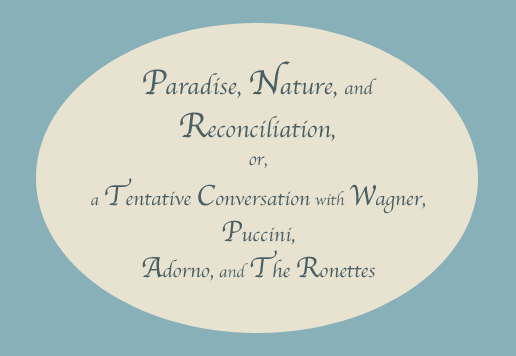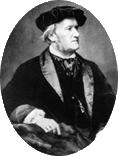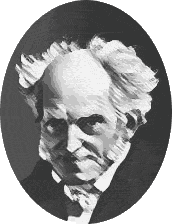
Richard Leppert, University of Minnesota
Printable
Version
PDF, 159K
- The setting is near Venice:
After a night spent in fever and sleeplessness, I forced myself to take a long tramp the next day through the hilly country, which was covered with pine woods. Returning in the afternoon, I stretched dead tired, on a hard couch, awaiting the long-desired hour of sleep. It did not come; but I fell into a kind of somnolent state, in which I suddenly felt as though I were sinking in swiftly flowing water. The rushing sound formed itself in my brain into a musical sound, the chord of E flat major, which continually re-echoed in broken forms: these broken chords seemed to be melodic passages of increasing motion, yet the pure triad of E flat major never changed, but seemed by its continuance to impart infinite significance to the element in which I was sinking. I awoke in sudden terror from my doze, feeling as though the waves were rushing high above my head. I at once recognized that the orchestral overture to the Rheingold, which must long have lain latent within me, though it had been unable to find definite form, had at last been revealed to me. I then quickly realised my own nature; the stream of life was not to flow to me from without, but from within. I decided to return to Zürich immediately, and begin the composition of my greatest poem. (Wagner 2: 603)
-
These remarkable and notably self-aggrandizing remarks from Mein Leben take up an account of the composer in a state of near total physical exhaustion. Having gotten himself out of Venice for a day, he seeks relief from the city’s noise in what he terms “the absolute calm” of a village (Spezia). He sleeps there but poorly, and the next day he forces himself into the woods for a solitary walk. He finds no relief. Returning to his hotel, he stretches out on a sofa and falls into a quasi-dream state. His dreaming is slightly nightmarish but hardly unique—not least it’s immensely productive. Wagner slips beneath the waves; it’s as though he’s drowning; indeed, he tells us that he awoke in a sudden terror. The dream he describes is musical, and in a key (and who else but Wagner would recount musical dreams of such specificity?). He is submerged in the flow of a river—a primordial soup, a river of life, whose movement slowly “progresses” toward history itself. The river is trying to “say” something in its re-echoing broken forms; melodies of increasing motion try to break through. The E-flat major chord never changes, and this changelessness, as Wagner puts it, “seemed by its continuance to impart infinite significance to the element”—water—in which he was sinking. Richard Wagner
Richard Wagner
- In the dream narrative, Wagner and water are each distinct and yet
the same, the confirmation of which comes at the end of the quoted
statement. In the river, wholly at one with it, Wagner recognizes
that the Nature external to him—the flowing water—was also
latent within him: what he describes as “my own nature; the stream
of life.” In his dream Wagner is momentarily reconciled with
nature, hence reconciled with his own nature (though the experience
produces a terror so startling that he awakens). The strikingly productive
result, so Wagner is keen to tell us, is the Ring, which is
after all very much about nature, including human nature. As Wagner
put it elsewhere in his autobiography: “it was in this great
prelude that [the] foundations of the entire [Ring] had to
be laid” (2: 611).
- The 136 bars on E-flat at the beginning of Rheingold (1853–54),
evoking the Rhine, unfold like an inexorable sonoric current gradually
increasing in intensity, its momentum functioning as a metaphor of
creation as regards both the opera’s narrative and its musical
undertow. That is, the E-flat Prelude, in all its purposeful monotony,
constitutes an Ur-motive for the opera as a whole, the musical
germ, as it were, from which is derived the music that will follow.
The audience may not actually hear precisely when
the music starts, deep in the double basses and quietly, as though
it were always “there,” below consciousness: that which
simply is—Nature itself.1
(Hear
Ex. 1)
- The Rhine is the locus of both literal and allegorical forces that
will drive a complicated myth of creation and ultimate destruction.
Wagner gives us a foretaste of its energy in the opening, which seems
always already to have been present, the terrestrial analogue to music
of the spheres. The E-flat pedal sounding in the double basses throughout
the Prelude, and the very slow unfolding of quasi-melody, doesn’t
so much take us out of time as never permit us into time in the first
place—until the very end. (Hear
Ex. 2) The music’s energy gradually increases and, as the
Prelude is interrupted abruptly at its dynamic and harmonic climax,
something else, wholly new, wholly different bursts forth via an abrupt
shift to an A-flat chord. The human voice comes onto the scene, at
first and only momentarily vocalizing linguistic nonsense (Weia! Waga!),
followed immediately by the introduction of recognizable language
and its unique discursive power. (Hear
Ex. 3) Language emerges, as it were, from nature, but in Wagner’s
tetrology it ultimately will serve the needs of humankind’s war
on nature as an instrumentalized device to advance cunning and guilt—this
will be evident within the opera’s first few minutes as the Rhinemaidens
employ language as a foil against the sexual desire of the ugly Alberich.
As the story goes: with love out of reach Alberich turns to power,
and plots successfully to steal the gold that designates agency over
everything, in essence, over Nature itself.
- These remarks are not quite sufficient. The conventional account
of the orchestral opening of Rheingold draws attention to a
telos of sorts, specifically the transformation that occurs in the
quasi evolutionary move from nature to history—however dystopian.
Time, in its relation to Progress as part of the myth of Modernity,
is critical to modernity’s realization. Yet, time in any ordinary
sense as it is experienced in 19th-century music is all but absent
from the ponderous opening of this music drama. What matters most
about the Rheingold Prelude, is, indeed, still time; but it
matters precisely by its absence. Well, not quite. There is a better
way to describe what Wagner is up to. The Rheingold Prelude
is “about” time’s (relative) absence but in a specific
dialectical relation to musical space. It is the spatial quality
of this music that is so striking, not its temporality. Time dramatically
makes its sonoric entrance only at the point at which the Prelude
is, in effect, abruptly cut off—that is, when the voice (the
human) and language (the human subject) are first heard. Moreover,
it is only with the voice that the possibility of Modernity (broadly
conceived) emerges, to the degree that the human voice will define
human dominion over nature, this dominion providing the central demarcation
for the modern (by which I mean history).2
-
Arthur Schopenhauer, in The World as Will and Idea, commented that he recognized “in the deepest tones of harmony, in the bass, the lowest grades of the objectification of will, unorganized nature, the mass of the planet.” He suggested that “Bass is thus, for us, in harmony what unorganized nature, the crudest mass, upon which all rests, and from which everything originates and develops, is in the world.” As for melody, “in the high, singing, principal voice leading the whole and progressing with unrestrained freedom, in the unbroken significant connection of one thought from beginning to end representing a whole, [one] recognize[s] the intellectual life and effort of man” (333–35). Schopenhauer held that what he termed “the phenomenal world, or nature, and music [are] as two different expressions of the same thing” (339). He insisted that, unlike any other art form, music was “connected with the inmost nature of the world and our own self,” and hence is universal. Unlike other art forms which merely represent the world, music, he claimed, is “as direct an objectification and copy of the whole will as the world itself, nay, even as the Ideas, whose multiplied manifestation constitutes the world of individual things. Music is thus by no means like the other arts, the copy of Ideas, but the very copy of the will itself, whose objectivity the Ideas are” (333).3 Arthur Schopenhauer
Arthur Schopenhauer
- Schopenhauer—to whom, incidentally, Wagner sent the text of
the Ring in 1854—recognized in music the sonoric trace
of a wholeness, and a creative force, upon which life itself depends,
as is evident in remarks that summarize his argument:
The unutterable depth of all music by virtue of which it floats through our consciousness as the vision of a paradise firmly believed in yet ever distant from us, and by which also it is so fully understood and yet so inexplicable, rests on the fact that it restores to us all the emotions of our inmost nature, but entirely without reality and far removed from their pain. … Its object is directly the will, and this is essentially the most serious of all things, for it is that on which all depends. (341) - I draw your attention to a single phrase from these remarks: music,
Schopenhauer insists, floats through our consciousness as the vision
of a “paradise firmly believed in yet ever distant from us.”
Music, that is, lets us see something—a vision—in which
we believe but cannot reclaim for lived experience. Music posits a
utopian reconciliation with nature, that which is us.
![]()
1 2 3 4 Endnotes Works Cited
| |
|
Articles
|
|
Leppert: Paradise, Nature, and Reconciliation Nicholson: “Hello Cleveland!” |
|
Interview
|
|
Review Essay
|
| |
|
Reviews
|
| |
|
|
|
|


